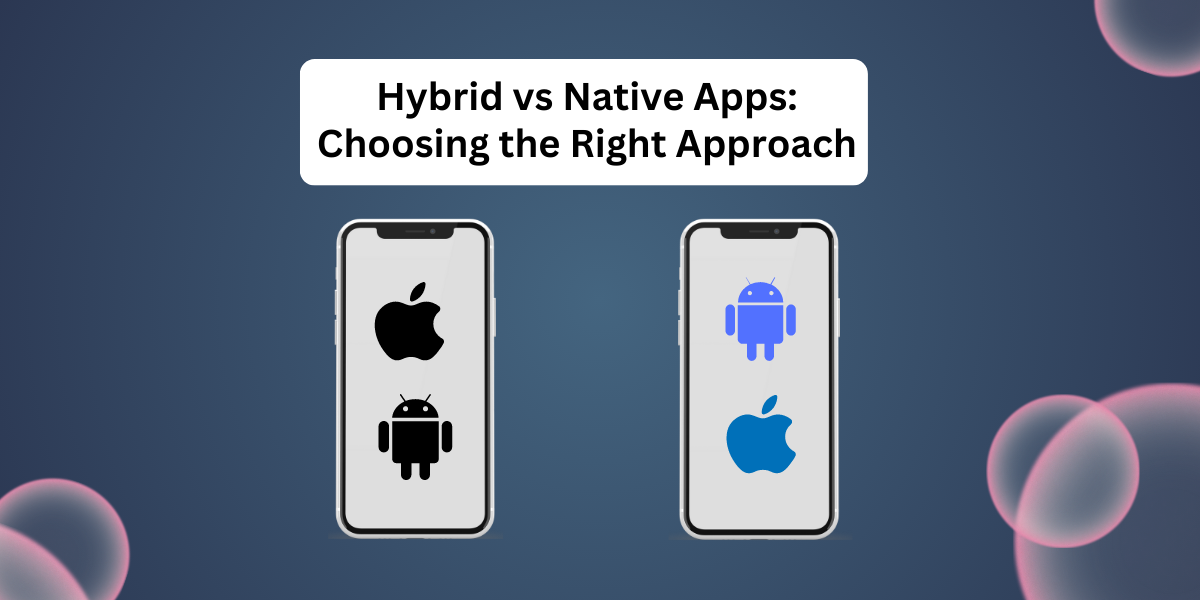Hybrid vs Native Apps: Choosing the Right Approach
Mobile App Development | 28-07-2023 | Emma Hazel

Native mobile apps have always emerged as winners whenever it came to speed and usability. But do you know that making such apps can cost you an arm and a leg? Yes, and it is the main reason many business owners refrain from investing in native mobile app development, no matter what the case is. Now we want to know, are you also facing some financial hurdles while trying to forge an excellent native mobile app for your organization? Do you want to receive expert guidance on how to deal with this issue? Then, we must advise you to hire remote developers straight away to create a hybrid mobile application for your brand.
But what is the benefit of doing so? You might ask. Well, the biggest advantage of constructing a hybrid app for your entity is that it doesn’t require two separate codebases to develop two apps for two operating systems, like Android and iOS. Yes, in the case of hybrid apps, software developers need to prepare just one codebase to fabricate promising mobile applications for iOS and Android operating systems. And that helps in not just saving a humongous amount of time during the development and maintenance of hybrid applications but the cost too.
Thus, if you do not have deep pockets to manufacture an exceptional mobile program for your brand, it makes sense to count on a hybrid approach as it will result in lower investment and greater profits compared to native applications. Ok? Got it? If yes, now it is time to gain briefer insights into other important details before you hire remote developers for your project, such as:
Some Statistics About Mobile Apps You Must Read Before You Hire iOS App Developers
- Mobile applications could produce $935 billion in revenue by the end of 2023.
- Approximately 90% of mobile internet time is consumed by apps.
- In 2021, no less than 3.8 trillion hours were spent on mobile programs.
- Over 2.9 million apps are present in the Google Play Store currently.
- Over 4.75 million apps exist in the Apple App Store.
- Somewhere around 70,000 new Android applications are published in the Google Play Store per month.
- For the past some time, mobile internet usage has been increasing continuously and desktop internet usage has been reducing.
- The smartphones of most internet users do contain over 80 applications.
- One of the biggest reasons why people remove mobile programs from their phones is because they aren’t in use.
- On average, 32,000 fresh iOS applications are submitted to the Apple App Store each month.
- More than 20% of all smartphone software in the Apple App Store is covered by game apps, which is twice the number of business apps.
Now, if you want to build any such app using the native or hybrid approach, it is in your best interest to have a casual conversation with experienced Android app developers immediately.
With that understood, now it is time to jump on to:
What is a Native App?
A native app is a special type of application that operates on a particular mobile operating system only. Such applications won’t be able to function on other operating systems if developed for one. Take, for instance, if you develop a native mobile program for the iOS platform, then you are likely to perform the entire development job in Swift. And the biggest benefit of forming native applications is that they can easily access all the features and functionalities of the preferred device and have higher chances to run without a hitch on that device if developed nicely.
But since native apps are not versatile applications, the Android app developers of an ace IT agency say that you need to fabricate an app twice, i.e., once for every operating system if you wish your app works properly on Android and iOS platforms. And all this can reduce the speed of your app development, resulting in more expenses down the line.
In most cases, it has been seen that the establishments that hire remote developers get their smartphone software built for a single operating system after choosing the native route. And once the concerned app starts showing promising results, then they go back, employ another developer, and make them recreate the same app for another OS.
What is a Hybrid App?
A hybrid app is capable of working on several platforms. It is written with the help of a single basic code language, such as:
- C#
- HTML5 and JavaScript combination
Once the entire code is typed in, the prospective application is compiled and executed on every operating system. And some seasoned Android app developers say that the “plugins use” for every OS will generally handle device-specific interactions. The greatest factor that motivates business owners to make the most of a hybrid approach is that they provide support for various operating systems. And that too at an extremely cost-effective price than several native applications.
Please remember, if a software developer creates a mobile app pretty well, normal users won’t be able to find out if it is a hybrid or native app in general. Also, most users actually do not care what development process you have adopted for your mobile app creation if it is working fine on their device and easily carrying out the job that they expect it to do.
However, there are some drawbacks of hybrid app development too if the words of accomplished Android app developers are to be believed. You might face some serious issues if your app requires some complicated interactions from the device. Because there is a limitation on what you can accomplish with the use of plugins in such a situation. Beyond this, you can’t forget that the cost of maintenance of hybrid applications could surpass that of native applications.
What is the main difference between native apps and hybrid apps as per dedicated Android app developers?
Considering that you are unversed, we must let you know that a hybrid app is a unique type of native app. Yes, just like native apps, you can download and install this sort of software application from app stores. However, you must be informed that the internal structure of hybrid apps and native apps are not the same. Because hybrid apps are very similar to web apps, resultantly they sit somewhere between web and native applications.
Now let’s take a look at a few instrumental aspects of both types of apps:
1. App development
Before you take the plunge to hire iOS App Developers, you must be notified that a software professional has to rewrite and redesign all the functionalities in the app in the native development language once you ask them to build a native application. But the good thing about hybrid apps is that they allow you to draft the app functionality in just one codebase. Once done, you can then put your code into a lightweight native app shell to make it appear like a native application. And the best part?
Well, the shell we are talking about enables you to make the most of native features in smartphones, like:
- Hardware
- Calendars
- Notifications
2. Cost efficiency
You might not know this, but some learned Android app developers say that hybrid apps have the ability to attain the same user experience and performance as that of native apps at a lower cost than you can imagine. Also, it is a walk in the park for development professionals to fabricate hybrid apps with the help of standard programming languages and technologies, such as CSS, JavaScript, and HTML5. Post that, they can integrate them with hybrid app development SDKs, like:
- Ionic
- Cordova
- React Native
Also, the time and cost required to develop hybrid apps are often lesser, but you can still publish them on different app stores to leverage the same reach and discoverability.
What are the key differences between hybrid apps and progressive apps according to the best Android app developers?
If you are uninitiated, we must notify you that progressive web apps are the result of enhancements that have taken place in browser technologies. Yes, modern browsers allow you to give your users a native app-like experience with the help of a web app only. And if you want to accomplish this feat, all you need to do is incorporate a JavaScript SDK around your current web application.
Just to let you know, a progressive web application has the ability to do multiple things like hybrid apps, such as:
- Send notifications through the mobile web browser
- Track user location
- And perform many similar things
And the most breathtaking news? Well, the IT agencies that allow clients to hire iOS App Developers state that progressive web apps are also somewhat similar to hybrid apps because the former also sits between web and native applications. Still, there are some differences that you must remain familiar with:
1. Organic reach
As far as the distribution of both hybrid and progressive web apps are concerned, you can make both of them available to your target audience through app stores. However, one advantageous news about PWAs is that they rank higher in search engine results without putting any extra effort. Besides that, you receive better search outcomes compared to hybrid applications with the same keyword targeting.
2. Maturity
The most qualified Android app developers confirm that PWA technology is newer than hybrid or web apps. As a result, the developer and community support for PWAs is still in the evolution stage. On the other side, the hybrid app development method is more mature and the cost of its creation remains light on the business owners’ pockets.
3. Performance
Often it has been observed that progressive web apps are lighter than hybrid apps in terms of size. What’s more? PWAs consume less memory and storage in mobile phones. Still, the technology it is built on is non-native. Thus, the dependency of progressive web applications on web browsers could result in upsurged consumption of mobile batteries of regular users. And if you want to build a fantastic PWA for your brand now, hire remote developers from a reputed IT establishment without a second thought.
When to rely on hybrid apps, native apps, and web apps in accordance with top Android app developers?
Do you know that bigger organizations often make use of the combination of hybrid, native, and web apps to reach out to the widest possible consumer base out there? But before you pick the best app type for your use case, it is advisable to take into consideration the below-mentioned factors now:
1. Time to market
Before you hire iOS App Developers for your native app development, we must deliver a small piece of information that early-stage start-ups love to use web apps when they need to release an MVP or Minimum Viable Product for their patrons at the earliest. Because native apps and hybrid apps need a higher amount of time compared to web apps along with more planning and effort to launch them successfully.
2. Marketing strategy
Are you aware that the app development project of some companies is bound closely to their marketing objectives? Yes, and this is why they take advantage of progressive web apps to reach a sizeable number of audience and receive initial sign-ups. And such apps might contain limited functionalities or render free trials for a specific timeframe while giving access to all the features. And as time goes by, the concerned establishments tap hybrid or native mobile apps to improve the usage experience of their paid customers if the POV of excellent Android app developers is to be believed.
3. Consumer requirements
There are certain products and services in the market that have maintained a large customer base for many years. And these buyers call on mobile apps daily to complete their desired jobs. Thus, in such circumstances, native apps are chosen over their web and hybrid counterparts.
4. Complexity
According to some top Android app developers, the mobile app features are so complex in a few cases that there is no other option except utilizing native or hybrid apps to support the given requirements. A case in point here is that mobile banking applications need native functionalities to support fingerprint authorization requirements.
The takeaway
So, now that you know in which situations it is wise to use hybrid, native, and other apps, it is time to hire remote developers and get a relevant application developed for your organization.

.jpg)

.jpg)
.jpg)
.jpg)
.jpg)
.jpg)


